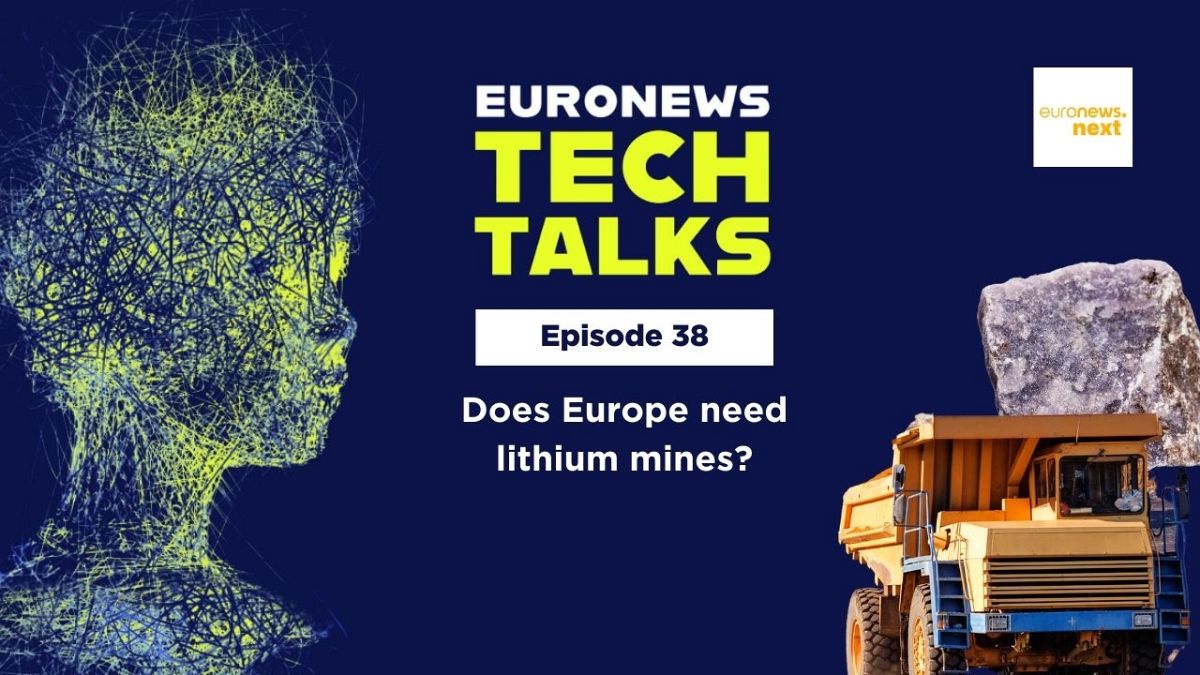Does Europe need lithium mining projects? Is there such a thing as responsible mining? This episode of Euronews Tech Talks delves into this heated debate with insights from experts.
Europe is believed to possess significant yet unexploited lithium resources in Germany, Czechia, Serbia, Spain, Portugal and Austria.
However, mining projects in these countries have faced strong opposition from citizens and environmental groups.
Since July 2024, Serbians have been taking to the streets to stop Rio Tinto’s lithium mining project in the Jadar Valley, a populated rural area in the northwest of the country.
Similarly, in Portugal, resistance to lithium mining in Barroso has been ongoing since May 2023. In Spain, residents of Cáceres, a small UNESCO World Heritage city, have been fighting against lithium projects for over six years.
In the latest episode of Tech Talks, Euronews delves into the debate on lithium mining in Europe with insights from two experts with contrasting views on the issue: Lindsey Wuisan, resource justice and new economies’ campaigner at the NGO Friends of the Earth Europe and Peter Tom Jones, director of KU Leuven Institute for Sustainable Metals and Minerals.
The costs of lithium mining in Europe
Friends of the Earth Europe is critical of lithium mining in Europe.
Wuisan said that lithium mining has irreversible environmental, societal, and cultural impacts.
The use of chemical products, the high water and energy demand, and challenges with waste management can impact biodiversity, jeopardise people’s access to clean water, and increase pollution, Wuisan said.
She also pointed out that mining projects can endanger the communities living near them.
“Companies try to sell them (mining projects) with the promise of creating jobs and economic opportunities, but they fail to mention that these benefits are temporary, while the degradation of the land and the impact on the landscape is going to affect the livelihoods of local populations forever,” she said.
Wuisan specified that although these consequences cannot be avoided, their intensity can vary depending on the behaviour of mining companies.
She argued that there are responsible ways of building mining projects but building them in Europe does not guarantee the companies will abide by the law.
“There are often multinational companies behind lithium projects. So there’s no guarantee that the profits will benefit the local population,” she added.
According to Friends of the Earth, opening mines in Europe will not decrease the problems experienced in the mines outside the EU borders, but it will simply increase mining projects globally.
For this reason, the NGO stresses the need to decrease lithium usage, invest in recycling methods, and explore more sustainable alternatives to this battery material.
“The demand and the use of lithium in our economy are simply too high. They exceed the planetary boundaries,” Wuisan said.
“If we just continue business as usual, we’re not solving any problems, not for the Global South, not for ourselves,” she added.
Responsible lithium mining in Europe
Peter Tom Jones had a more positive outlook on lithium mining projects in Europe.
He acknowledged the negative and irreversible impacts of mining on the environment and its local communities but believes that these can be minimised, especially in Europe.
Among the measures he believes could make mining more responsible are using renewable energy to power operations, employing dry stacking of the sandy leftover materials to reduce fire risks, recycling water, ensuring transparency of the mining projects, and involving local communities by providing jobs, paying fair wages, and ensuring they benefit from the mines.
According to Jones, this will help Europe meet its demand for lithium while ensuring responsible mining practices within its borders.
“The European Union is living, or was living, in this open global trade world where everything was open and free, and we could just import our stuff from elsewhere,” Jones said of Europe’s dependency on imported lithium.
“We abdicated our responsibility. We said, okay, let the mining be done somewhere else where it’s out of sight, out of mind, and if it’s dirty there, then we don’t face the social or environmental problems,” he added.
Jones argued that lithium mines are essential to the green transition, and cannot be replaced by recycling.
Checkout latest world news below links :
World News || Latest News || U.S. News
The post Does Europe need lithium mining projects? | Euronews Tech Talks appeared first on WorldNewsEra.

